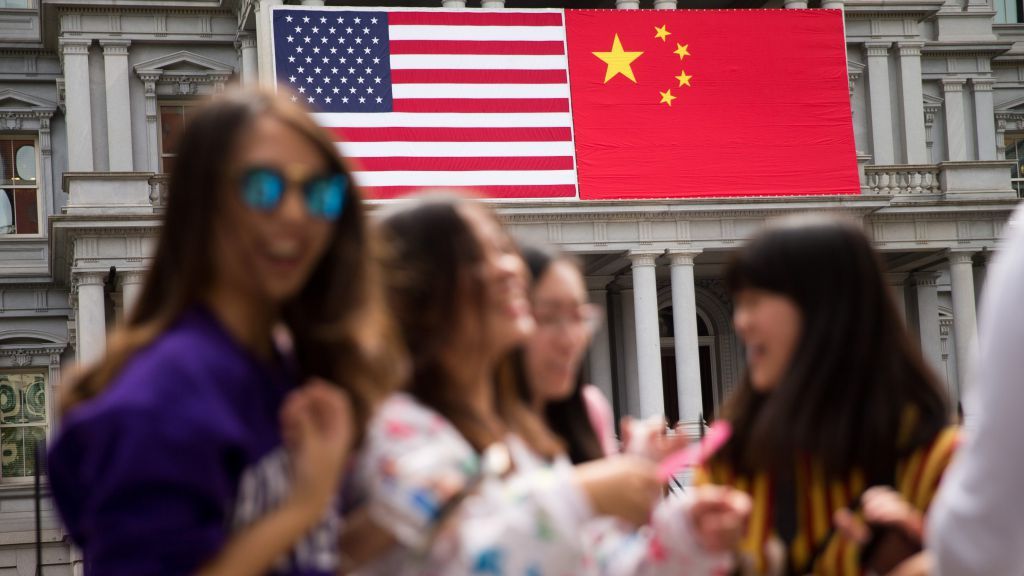Media Report

- Quartz comments: "Americans have become more negative toward China, and they're increasingly anxious about the US's power in the world. The two concurrent trends, according to Pew Research surveys conducted over the past decade, are summarized by the Washington DC-based think tank in a report published last week. During the period, American hostility toward China surpassed Chinese hostility toward the US, Pew said. In 2016, 55% of Americans held an unfavorable opinion of their biggest Asian rival, compared with 44% of Chinese who felt the same about the US. Meanwhile, more Americans now believe US power is waning. In 2016, 46% of the American public said the US plays a less important and powerful role as a world leader compared with 10 years ago. The figure was up from 20% in 2004, according to the report. When it comes to the global balance of power, two-thirds of Chinese said in 2015 that their country would eventually replace the US—or has already replaced it—as the world's leading power, according to Pew. Americans were split—but more pessimistic—when asked the same question. In 2015, about half of Americans believed China would never replace the US as the top global power. By contrast, in 2009, 57% of Americans thought that scenario would never happen."
- Bloomberg reports: "A rerun of China's massive stimulus during the financial crisis is set to offer another boost to global metals prices, according to Goldman Sachs Group Inc. Strong credit expansion has 'remarkably bullish' implications for the nation's metals-intensive industries as fixed-asset investment and manufacturing are poised to accelerate, the bank said in a report. New lending to the so-called old economy in December and January jumped by 1.1 trillion yuan ($160 billion) from a year earlier, equivalent to more than one and a half years of U.S. President Donald Trump's mooted infrastructure package, it said. Industrial commodities have enjoyed a rebound in the past year on improved demand from property and infrastructure in China, the world's top metals user. The benchmark copper price in London is up 32 percent from a year ago, while iron ore has nearly doubled. This time last year, the Chinese government embarked on a massive credit-driven stimulus in response to an economic slowdown, boosting credit at a pace not seen since the 2009 financial crisis. 'The resulting acceleration in metals demand is expected to push the copper market, as well as other base metal markets such as nickel and zinc, into deficit, leading to inventory draws, a tightening of the futures curve spreads, and higher prices,' the bank's analysts including Mikhail Sprogis and Jeffrey Currie wrote in the note dated Feb. 16."
- The Atlantic comments: "Each winter, hundreds of AI researchers from around the world convene at the annual meeting of the Association of the Advancement of Artificial Intelligence. Last year, a minor crisis erupted over the schedule, when AAAI announced that 2017's meeting would take place in New Orleans in late January. The location was fine. The dates happened to conflict with Chinese New Year...The 2017 AAAI meeting—which ultimately relocated to San Francisco—wrapped up just last week. And as expected, Chinese researchers had a strong showing in the historically U.S.-dominated conference. A nearly equal number of accepted papers came from researchers based in China and the U.S. "This is pretty surprising and impressive given how different it was even three, four years back," says Rao...China's rapid rise up the ranks of AI research has people taking notice. In October, the Obama White House released a "strategic plan" for AI research, which noted that the U.S. no longer leads the world in journal articles on "deep learning," a particularly hot subset of AI research right now. The country that had overtaken the U.S.? China, of course."
Calendar
- 2017-02-15 Killing of Kim Jong Un’s Brother Intrigues North Korea’s Estranged Ally China
- 2017-02-14 China's credit growth poses challenge, but tightening seen gradual
- 2017-02-13 North Korea: missile test success claim as China rejects US criticism
- 2017-02-12 RPT-China gets an early win off Trump, but many battles remain
- 2017-02-10 Beijing’s Patience Pays Off With Trump’s Reaffirmation of ‘One-China’ Policy
- 2017-02-09 China Praises Trump's Letter to Xi, Belated Well-Wishes
- 2017-02-08 Task force backs Trump’s tough line on China trade
- 2017-02-07 China, United States cannot afford conflict: Chinese foreign minister
- 2017-02-06 EU trade chief backs China in fight against protectionism
- 2017-02-05 Chinese Luxury Shoppers' Newest Destination: China
News
- Bloomberg Goldman Sees Metal Rally in Sight on Rerun of '08 China Stimulus
- The Guardian China 'eliminating civil society' by targeting human rights activists – report
- Reuters China demands Vietnam's apology for attack alleged by tourist
- The Wall Street Journal China Takes Breather From U.S. Treasury Selloff
- Bloomberg China Loses a Friend, and Leverage, With North Korean Murder
- Reuters Chinese firm files complaints with Chinese government over McDonald's China sale
- The Washington Post Trump gets his trademark in China. But he won't be reaping the benefits.
- The Wall Street Journal China Imposing More Oversight on Foreigners Who Live-Stream
- NPR China Blacklists Carfentanil, Closing A Deadly Loophole Facebook Twitter Google+ Email
- The Associated Press Police, Pollution Protesters Clash in Northern China City
- BBC Rex Tillerson in guarded co-operation approach to Russia
- The Financial Times China returns as net buyer of US Treasuries
- The Financial Times China Inc hits brakes on foreign property investment
Commentary
- Quartz How Americans and Chinese view their countries and each other, in three charts
- The Atlantic China's Artificial-Intelligence Boom
- The National interest Did North Korea Just Launch a Chinese Missile?
- Forbes New Chinese Missile Upgrade Likely Designed With Taiwan In Its Crosshairs
- The Diplomat Will China Pay for Syria to Rebuild?
- Foreign Policy Trump's Deafening Silence on Africa
